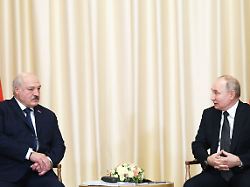Secret document found
Kremlin plans gradual takeover of Belarus
2/21/2023 3:32 am
Months before invading Ukraine, the Kremlin is apparently planning to annex another neighboring state. However, this should take place without military means: A leaked paper from the Moscow presidential administration explains how Belarus is to be gradually annexed to Russia by 2030. Experts classify it as genuine.
According to a report by the “Sueddeutsche Zeitung” (SZ) apparently plans to gradually take over neighboring Belarus. This is suggested by a document that is said to come from the Moscow presidential administration and that the SZ evaluated together with the WDR, the NDR and nine other European media. It is said to have been written a few months before Russia’s attack on Ukraine.
According to the research, the strategists of Russian President Vladimir Putin want to infiltrate Belarus politically, economically and militarily. The goal is a common Union state under Russian leadership by 2030. Western security circles consider the paper to be authentic, according to the “Süddeutsche Zeitung”.
The internal 17-page Kremlin document, titled “Russian Federation’s Strategic Goals in Belarus,” appears to date from the summer of 2021. It describes how the Kremlin aims to become a sovereign and independent European nation using short-, medium- and long-term goals gradually incorporated by 2030 – without the need for military intervention. It is subdivided into the areas of politics and defence, trade and economy, and society.
The first interim goal is therefore 2022. According to the report, the population – especially political and military elites – should be influenced pro-Russian by then and Western influences pushed back in order to create a bulwark against NATO. Joint military maneuvers are also planned. The constitutional reform begun in Belarus should be completed according to Russian conditions, and laws should be “harmonized” with those of the Russian Federation, it said. Among other things, they want to expand the Russian military presence in Belarus by 2025 and simplify the issue of Russian passports to the population. Energy supply, transport and communication are to be integrated into the Russian systems. Finally, in 2030, Russia and Belarus should become a union state, with uniform border, customs and tax policies, joint military leadership and a common currency. Russian should become the dominant state language.
A piece of the puzzle in Putin’s grand plan
According to the newspaper, experts classify the paper as genuine. “In its external form, the document resembles a standard document of the Russian bureaucracy or political administration,” says Martin Kragh, deputy director of the Stockholm Center for Eastern European Studies (SCEEUS). The content is “largely consistent with Russia’s political goals towards Belarus since the 1990s.”
Several Western intelligence agencies that were shown the paper also found it credible. “The content of the document is absolutely plausible and corresponds to what we also perceive,” the SZ quoted a high-ranking intelligence officer as saying. One must see the strategy paper as part of a larger plan by Putin: the creation of a new Greater Russian Empire.
“Russia’s goals in Belarus are the same as in Ukraine,” Michael Carpenter, US ambassador to the Organization for Security and Co-operation in Europe (OSCE) told the newspaper. “Only that Moscow is using coercion rather than war in Belarus .” In the end, both cases are about restoring Greater Russia. Franak Viacorka, chief adviser to exiled Belarusian opposition politician Svetlana Tikhanovskaya, warned the plan was a blueprint. It could also be used “for Kazakhstan, Armenia, Moldova”.
Russian influence in neighboring Belarus has increased significantly since the summer of 2020. After the allegedly manipulated presidential election in August 2020, the Belarusian ruler Alexander Lukashenko was able to count on economic and personal support from Moscow – at the price of his own independence. Among other things replaced journalists loyal to the Kremlin the striking staff of the Belarusian state media. Also the cooperation of the secret services was already intensified at that time.
